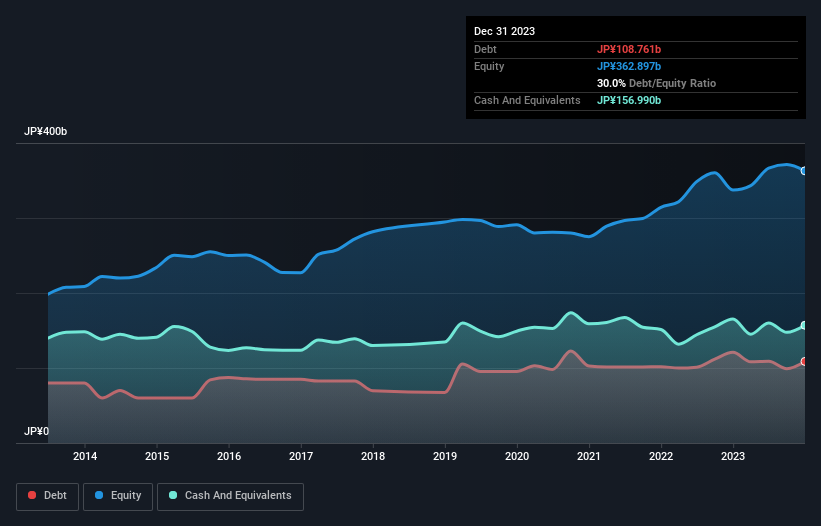
Some say volatility, rather than debt, is the best way to think about risk as an investor, but Warren Buffett famously said that 'Volatility is far from synonymous with risk.' When we think about how risky a company is, we always like to look at its use of debt, since debt overload can lead to ruin. We note that THK Co., Ltd. (TSE:6481) does have debt on its balance sheet. But the more important question is: how much risk is that debt creating?
When Is Debt A Problem?
Debt and other liabilities become risky for a business when it cannot easily fulfill those obligations, either with free cash flow or by raising capital at an attractive price. In the worst case scenario, a company can go bankrupt if it cannot pay its creditors. However, a more usual (but still expensive) situation is where a company must dilute shareholders at a cheap share price simply to get debt under control. Of course, the upside of debt is that it often represents cheap capital, especially when it replaces dilution in a company with the ability to reinvest at high rates of return. The first step when considering a company's debt levels is to consider its cash and debt together.
Check out our latest analysis for THK
What Is THK's Debt?
As you can see below, THK had JP¥108.8b of debt at December 2023, down from JP¥120.9b a year prior. However, its balance sheet shows it holds JP¥157.0b in cash, so it actually has JP¥48.2b net cash.

How Strong Is THK's Balance Sheet?
We can see from the most recent balance sheet that THK had liabilities of JP¥73.6b falling due within a year, and liabilities of JP¥119.8b due beyond that. On the other hand, it had cash of JP¥157.0b and JP¥84.9b worth of receivables due within a year. So it actually has JP¥48.4b more liquid assets than total liabilities.
This surplus suggests that THK has a conservative balance sheet, and could probably eliminate its debt without much difficulty. Succinctly put, THK boasts net cash, so it's fair to say it does not have a heavy debt load!
It is just as well that THK's load is not too heavy, because its EBIT was down 51% over the last year. Falling earnings (if the trend continues) could eventually make even modest debt quite risky. There's no doubt that we learn most about debt from the balance sheet. But it is future earnings, more than anything, that will determine THK's ability to maintain a healthy balance sheet going forward. So if you want to see what the professionals think, you might find this free report on analyst profit forecasts to be interesting.
Finally, a company can only pay off debt with cold hard cash, not accounting profits. THK may have net cash on the balance sheet, but it is still interesting to look at how well the business converts its earnings before interest and tax (EBIT) to free cash flow, because that will influence both its need for, and its capacity to manage debt. In the last three years, THK created free cash flow amounting to 17% of its EBIT, an uninspiring performance. For us, cash conversion that low sparks a little paranoia about is ability to extinguish debt.
Summing Up
While we empathize with investors who find debt concerning, you should keep in mind that THK has net cash of JP¥48.2b, as well as more liquid assets than liabilities. So we don't have any problem with THK's use of debt. When analysing debt levels, the balance sheet is the obvious place to start. However, not all investment risk resides within the balance sheet - far from it. These risks can be hard to spot. Every company has them, and we've spotted 1 warning sign for THK you should know about.
If you're interested in investing in businesses that can grow profits without the burden of debt, then check out this free list of growing businesses that have net cash on the balance sheet.
Valuation is complex, but we're here to simplify it.
Discover if THK might be undervalued or overvalued with our detailed analysis, featuring fair value estimates, potential risks, dividends, insider trades, and its financial condition.
Access Free AnalysisHave feedback on this article? Concerned about the content? Get in touch with us directly. Alternatively, email editorial-team (at) simplywallst.com.
This article by Simply Wall St is general in nature. We provide commentary based on historical data and analyst forecasts only using an unbiased methodology and our articles are not intended to be financial advice. It does not constitute a recommendation to buy or sell any stock, and does not take account of your objectives, or your financial situation. We aim to bring you long-term focused analysis driven by fundamental data. Note that our analysis may not factor in the latest price-sensitive company announcements or qualitative material. Simply Wall St has no position in any stocks mentioned.
About TSE:6481
THK
Engages in the manufacture and sale of mechanical components worldwide.
Flawless balance sheet with reasonable growth potential.
Similar Companies
Market Insights
Community Narratives



